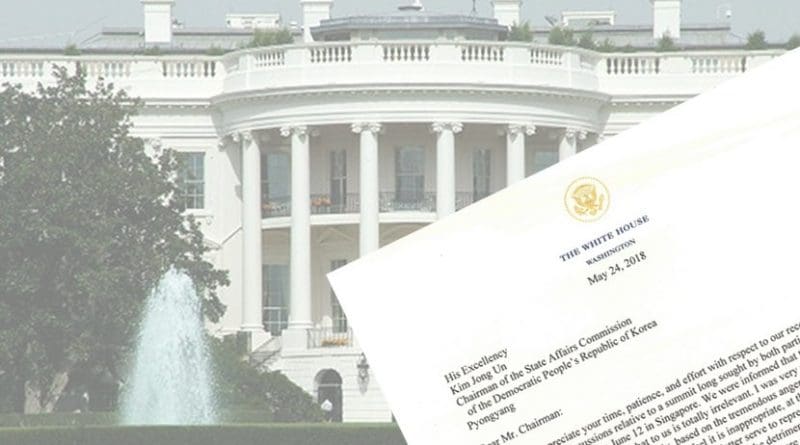The On-Off (And Maybe On Again) Summit – OpEd
By Arab News
By Cornelia Meyer*
US President Donald Trump wrote to the North Korean leader Kim Jong Un on the evening of May 24, calling off their summit meeting scheduled for June 12 because of the “tremendous anger and open hostility” emanating from Pyongyang — a reference to earlier statements by North Korea’s First Vice Minister of Foreign Affairs, Kim Kye Gwan.
“Some day, I look very much forward to meeting you,” Trump wrote, leaving the door open. When the North Korean response was emollient, and Kim said he would be willing to meet Trump at any time, the latter responded that this was still a possibility, perhaps even on June 12 as originally planned. This on-off (and now maybe on again) summit is more like the plot of a Latin-American telenovela than high-stakes foreign policy.
If the summit is indeed postponed, there is some good in that — but also some bad in how the postponement was announced.
First, the good: A meeting on June 12 would leave insufficient time for in-depth preparation of the negotiating alternatives and their potential outcomes. Two trips to North Korea by US Secretary of State Mike Pompeo do not compensate for detailed preparatory work by professional civil servants.
For example, the two countries define denuclearization very differently. Former US Secretary of Defense William Perry put it aptly during Chosun Ilbo’s Asian Leadership conference in Seoul this month; he explained that to North Korea the situation looked very different from the six-party talks in the mid 2000s. Then, they had to give up the prospect of building nuclear weapons; now, they would have to give up an actual arsenal, which is clearly much more difficult. Unless both sides understand the initial definition of denuclearization, and what it would mean if they made concessions, they are not ready to talk.
There may also be time to familiarize the US President, who is no fan of multilateralism, with another “home truth”; after a potential denuclearization on the peninsula any inspection regime would have to be multilateral, as there are no bilateral alternatives. The UN’s International Atomic Energy Agency would most probably be charged with the task, because it is currently the only organization equipped to do so.
And now the bad: The US U-turn stunned its long-term ally on the peninsula. South Korea’s President Moon Jae-in had invested a lot in this summit. It was his overture to the North during the Winter Olympics in Pyeongchang that made a dialogue possible. He then drove the agenda further during the Moon-Kim summit in April. Its “Panmunjom Declaration for Peace, Prosperity and Unification of the Korean Peninsula” even goes so far as to mention a reunification of the two Koreas. Moon has staked his career on a rapprochement with the North. He was also instrumental as a mediator between Trump and Kim when the latter put the summit into question because of military exercises between South Korea and the US, and the ill-timed and ill-judged comparison of North Korea to Libya by US national security adviser John Bolton. Libya’s disarmament famously resulted in regime change, the death of Muammar Gadaffi and a failed state — all red flags to the North Korean leadership.
There are further benefits to having bought time. It is important for the US president’s negotiators to understand the position of all parties involved. The six-party talks were a useful framework in that all the major stakeholders were at the table. Any resolution is significant not just to the two Koreas and the US, but also to China, Russia and Japan.
China will make its influence heard and felt. It has promised billions in aid to North Korea if it renounces nuclear weapons. China as well as Russia have every interest in the North Korean economy not falling into further disrepair because of UN sanctions. Even moderately prosperous nations make better neighbors than destitute ones, and nobody wants to share a border with a failed state. There are also opportunities for Chinese companies in sharing in North Korea’s reconstruction and resources. China and Russia share one concern with the North: The presence of the US military in the demilitarized zone is a thorn in their collective side.
Here, Trump needs to be careful: It is precisely that military presence which has allowed South Korea to achieve prosperity and become the world’s 12th largest economy. It is also that presence, alongside US naval and military bases in Japan, which has given “military air cover” and assured security to Japan, and to a lesser extent to Taiwan. Whatever Trump does, he must not bargain away the presence of US forces on the peninsula. The security of his allies in the Northern Pacific depends on it.
Hopefully the latest wobbles have given the US president time to consult and truly understand the position of his most important allies on the Pacific Rim. At the Chosun Ilbo conference, the former Speaker of Japan’s House of Representatives, Yohei Kono, issued a stark reminder that Japan was an interested party in what happened on the Korean peninsula. The US should consult with its allies before making decisions. The days of in-depth US co-ordination with allies, as we have seen since the fall of the Berlin Wall, are probably over. There is, however, a world of difference between going it totally alone and making progress while taking the concerns of one’s allies into consideration.
*Cornelia Meyer is a business consultant, macro-economist and energy expert. Twitter: @MeyerResources

